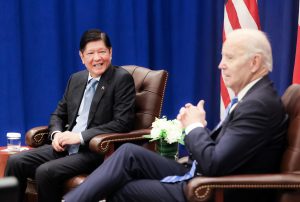Yesterday, U.S. President Joe Biden held his first in-person meeting with the Philippines’ new President Ferdinand Marcos Jr. in New York City. The overall tone of the meeting was one of putting aside past disagreements and getting on with the business of strengthening a long-standing security relationship that both nations view as vital in an era of rising Chinese power.
During the meeting, which took place on the sidelines of the U.N. General Assembly session, which Marcos addressed earlier this week, Biden “reaffirmed the United States’ ironclad commitment to the defense of the Philippines,” according to the official State Department readout. The two leaders “discussed the situation in the South China Sea and underscored their support for freedom of navigation and overflight and the peaceful resolution of disputes.” They also discussed “energy security, climate action, and infrastructure,” the Russia-Ukraine war, and the ongoing crisis in Myanmar.
“We’ve had some rocky times, but the fact is it’s a critical, critical relationship, from our perspective. I hope you feel the same way,” Biden said in a press conference ahead of the meeting.
“For decades, the alliance has strengthened both of us, I believe,” he added. “And one of the things I want to talk about today is how we continue to strengthen that and work together on the things that are of greatest concern to you.”
“Rocky” would be one way of describing the six years under President Rodrigo Duterte, who steered the Philippines toward Beijing and spurned Washington, partly due to U.S. criticisms of his violent “war on drugs,” and partly as a result of more deeply-rooted personal and political resentments.
While Marcos is unlikely to wholeheartedly embrace the U.S. policy of containment toward China – he has spoken of the need for Manila to have fruitful economic relations with Beijing, for instance – it is clear that his administration is returning to the historical pro-U.S. mean after a turbulent period in bilateral relations. “The role of the United States in maintaining the peace in our region is something that is much appreciated by all the countries in the regions and the Philippines especially,” Marcos said ahead of yesterday’s meeting.
Less than three months into his six-year term, the new Philippine leader has already gone one better than Duterte in actually visiting the U.S., something that his predecessor swore he would never do after President Barack Obama criticized his drug war.
While from a certain perspective the meeting between Biden and Marcos seems incongruous, given Marcos’ controversial background and the Biden administration’s claimed commitment to human rights, the strategic logic makes sense.
For reasons of Cold War expediency, and despite the Carter administration’s concerns about his repressive and corrupt rule, the U.S. government was a strong backer of Ferdinand Marcos Sr. during his 22-year rule. In 1982, Marcos was hosted at the White House by President Ronald Reagan, who reportedly considered the Marcoses personal friends.
While Marcos’ 1982 visit (his first since shortly after his inauguration) was protested by Filipino exiles and some members of Congress, who balked at his grand-scale corruption and the severe curtailment of human rights that was taking place under Martial Law, the Washington Post reported that “administration spokesmen instead have emphasized the strategic importance of the Southeast Asian nation, which is home to two major U.S. bases, Clark Air Base and Subic Naval Base.” It added, “U.S. officials say it is unlikely that human rights questions will come up in the discussions between Marcos and Reagan.”
All of this offers a striking parallel to the present, in which Washington views Manila as a vital strategic bulwark against the expanding maritime power and ambition of China, despite its concerns about domestic political developments in the Philippines. For his own part, Marcos Jr. has helped U.S. officials square the circle between a rhetorical support for human rights and increased strategic engagement.
As the political analyst Roman Casiple told Arab News this week, Marcos has been “very careful” in “trying to distance himself” from his father’s legacy since his swearing-in as president June 30 – even as he has defended his father against claims that he was a “dictator.” “I think he wants to present himself before the world as kind, compassionate,” Casiple said.
This was reflected in the Philippine leader’s address to the U.N. General Assembly this week, where he pushed for action on inequality and climate change. “The effects of climate change are uneven and reflect a historical injustice: Those who are least responsible suffer the most,” Marcos said.
The president has also attempted to distance himself at least to some extent with the legacy of his predecessor. Shortly before departing for the U.S., Marcos pledged to reassess and take a more holistic approach to the “drug war,” the subject of abiding U.S. concerns.
For the moment, these rhetorical adjustments seem to have done the trick. While human rights was reportedly discussed during Marcos’ meeting with Biden, its position in the official readout and in Biden’s remarks spoke volumes about its relative importance. In both instances it came dead last.

































